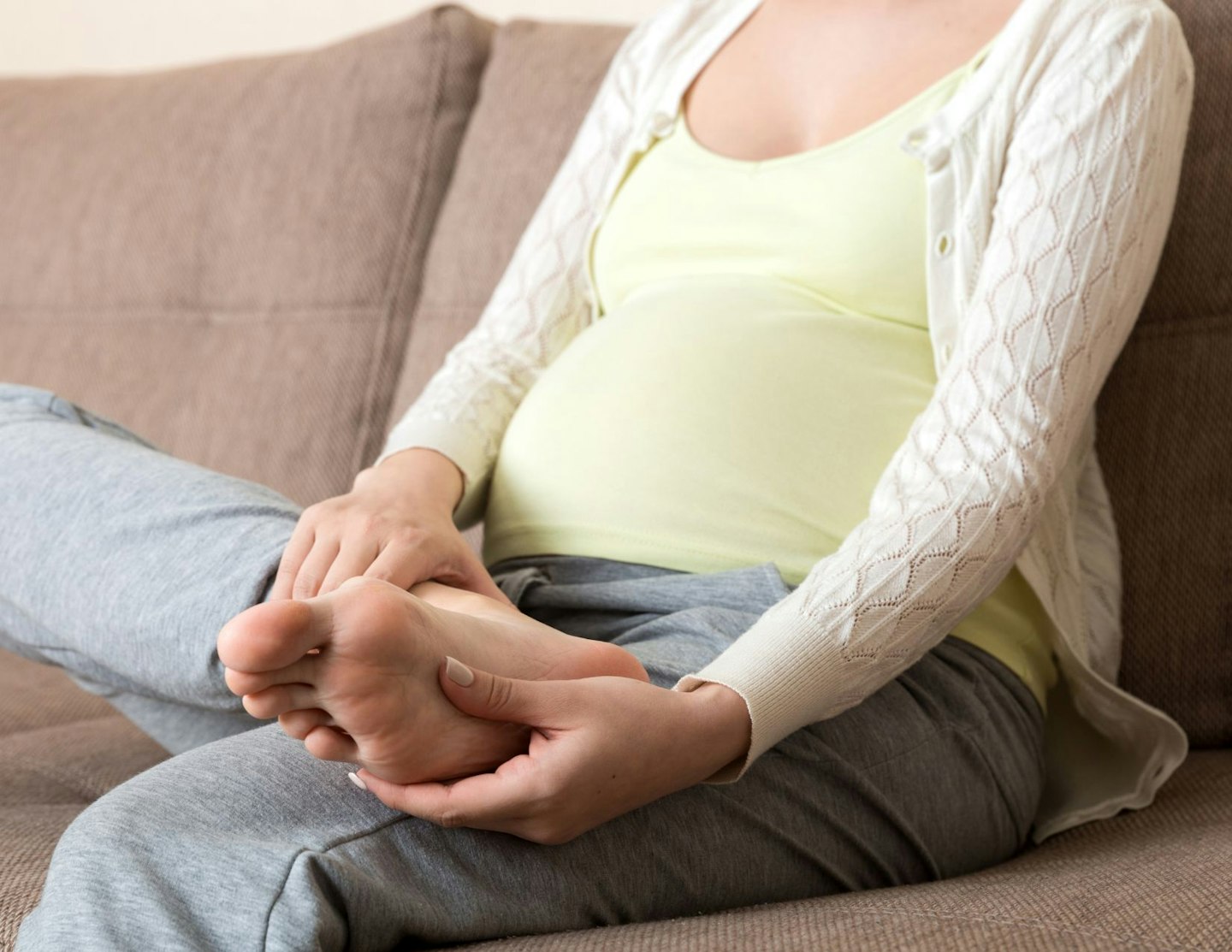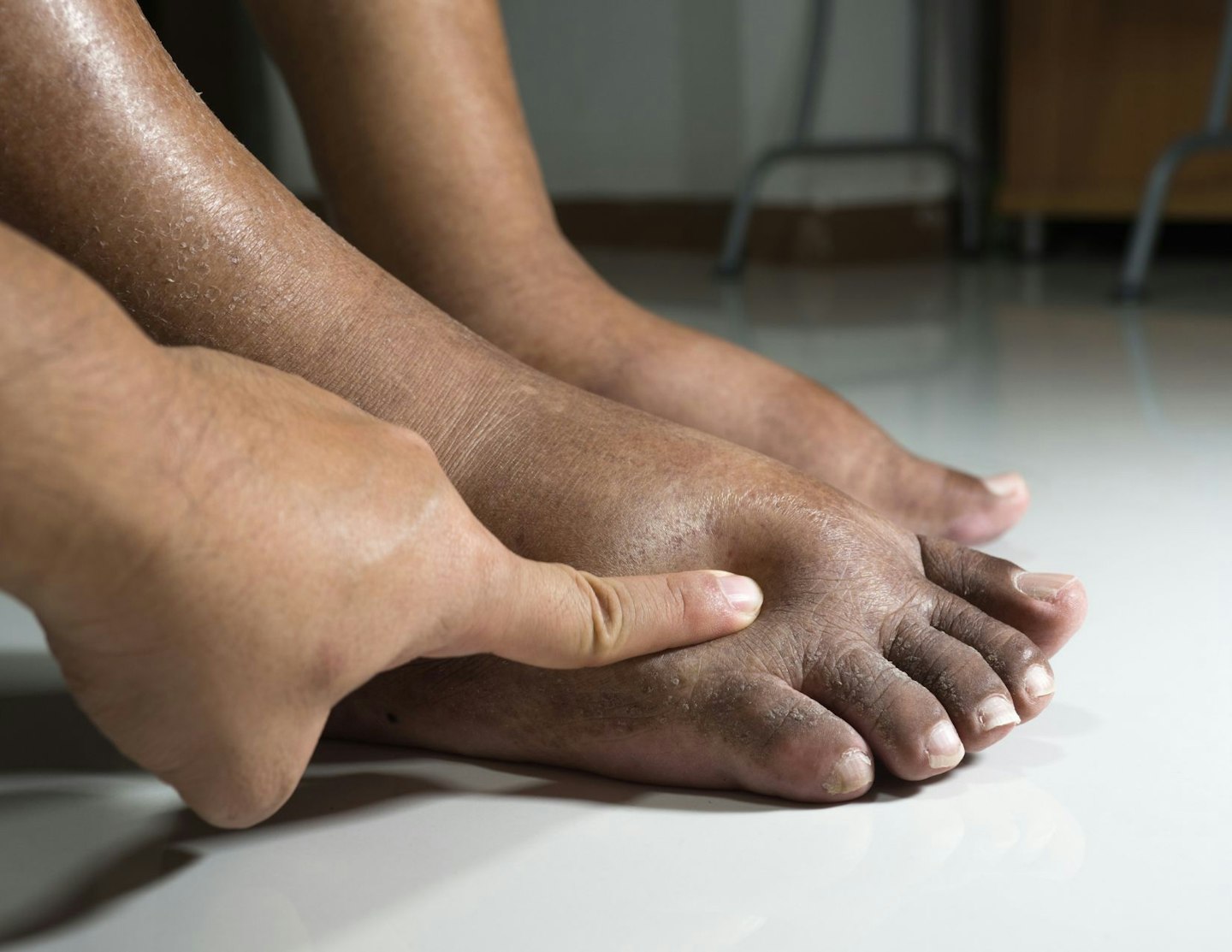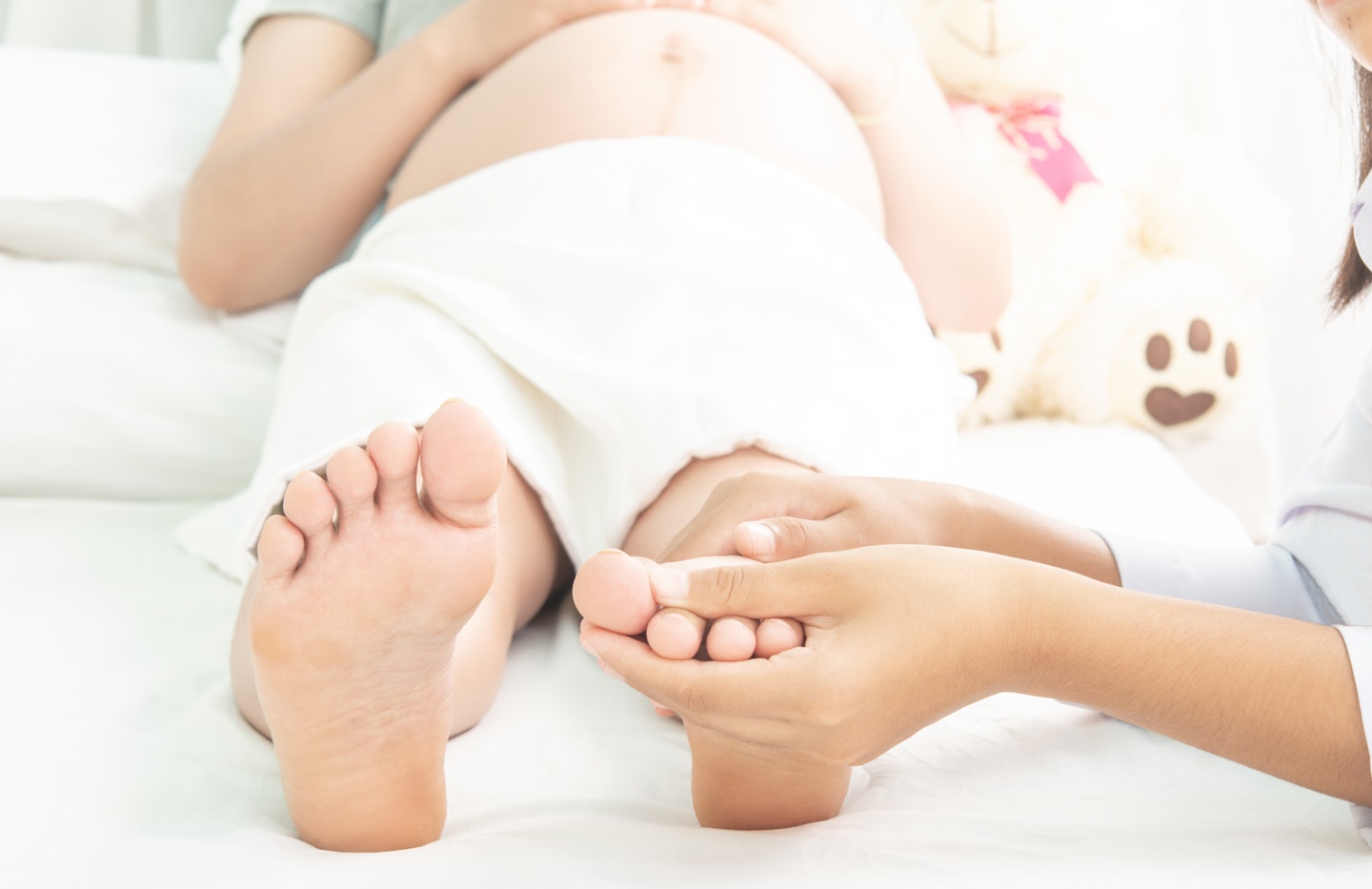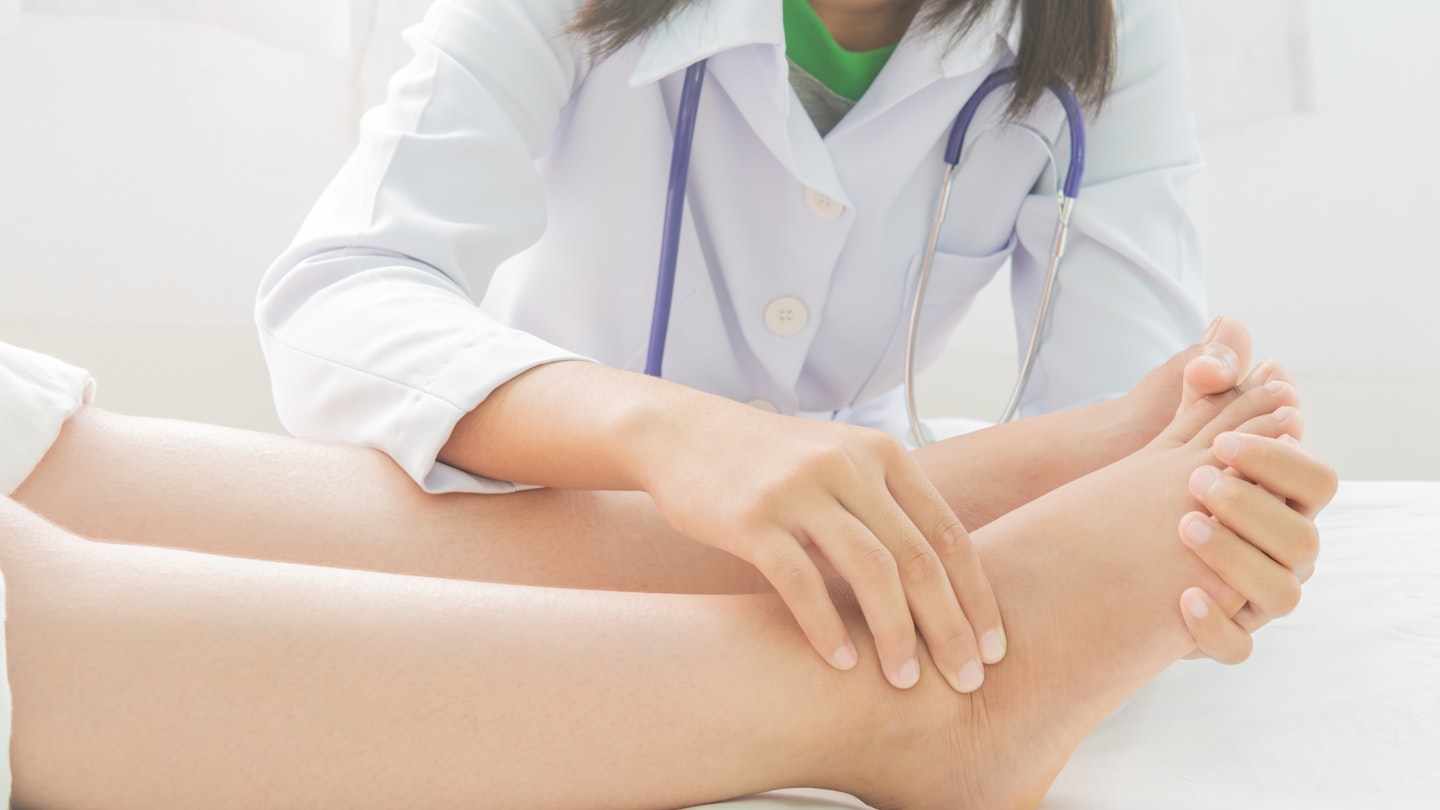
Medically Reviewed by: Dr. Tiffany Pham
While it's generally a joyful time, pregnancy and pregnancy symptoms can be pretty hard-going at times. From extreme fatigue to morning sickness, back pain to headaches and migraines - it's not exactly a bed of roses all the time. But one symptom that isn't talked about enough, is feet swelling or to use the technical name, Oedema.
Swelling, like morning sickness, is a pregnancy symptom that many expect. You are bound to notice mild swelling in your body throughout pregnancy, but it might feel particularly severe in your ankles and feet, thanks to the laws of gravity and you'll probably be wondering how to reduce swollen feet during pregnancy.
Whether you're pregnant and already struggling with swollen feet, or you just want to prepare for possible pregnancy symptoms, here's everything you need to know about your feet swelling in pregnancy, including how to reduce swelling in feet during pregnancy.
What causes your feet to swell during pregnancy?
Your ankles and feet can swell when you're pregnant because your body fluids are increasing to maintain adequate blood flow to both mum and baby, and blood volume also increases to make up for the blood loss that occurs after delivery. It all sounds very technical, but all it means is that you may well be experiencing swollen ankles and even hands too.
That combined with the added weight and pressure on your legs, ankles, and feet can create a uncomfortable feeling. Yes, it's common, but that doesn't mean it's any less frustrating - but you'll be relieved to hear there are ways to get some relief.

When can I expect feet swelling to happen?
The majority of women experience their feet swelling, plus swollen ankles, around week 22 to week 27 of pregnancy. After that it can, unfortunately, stick around until you're due to give birth. But 1 in 4 women don't experience any swelling at all, so feet swelling may not be something you have to worry about!
The amount of feet swelling you experience can vary by the hour. It increases in the evening and is affected by the weather, for example, it's often worse in the heat.
When should swelling during pregnancy be a concern?
In the majority of cases, swelling in pregnancy isn't dangerous. The swelling of the ankles and feet caused by Oedema is harmless and perfectly normal! That being said, you should contact a doctor if you experience excessive or extremely painful swelling as it could be a sign of pre-eclampsia.
How do I know if my swollen feet is pre-eclampsia?
If swelling is accompanied by a variety of other symptoms such as elevated blood pressure, rapid weight gain and protein in the urine, there's a chance it could be pre-eclampsia. So if your blood pressure and urine are normal (they're checked at each prenatal visit), there's nothing to worry about. As always, talk to your GP or midwife if you're concerned.
A good way to test for possible pre-eclampsia when it comes to swollen feet is to press down into the skin - if this leaves an indentation for a few seconds, it could be a sign of a more serious issue.

Does swelling feet mean labour is near?
Swelling can increase in the later stages of pregnancy and increased temperatures can lead to more dilation of the blood vessels which will further increase swelling. So while having swollen feet doesn't signal the start of labour, it is one of the symptoms you might experience as you get closer to your due date.
How to reduce swollen feet during pregnancy?
The good news is, there are a number of ways to relieve and prevent swelling of feet during pregnancy.

• Elevate your legs when sitting
If you're still at work and your job is desk-based, try to keep your legs up as much as possible. This will stop the excess fluid pooling around your feet.
• Sleep on your side
Try to sleep on your side. Some experts suggest that sleeping on the left side occasionally helps to reduce the pressure on the inferior vena cava - the major vein that drains all of the blood from the lower extremities and brings it back to the heart. When you put more pressure on this vein, it can increase the swelling in the lower extremities. However, the NHS states that you can sleep on either side, left or right. If you find yourself moving around in the night, a pregnancy pillow could help.
• Exercise
Try to take some pregnancy-friendly exercise such as walking or swimming. It doesn't have to be intensive exercise, even walking is good for swollen feet during pregnancy so pull on your trainers and head out for a gentle stroll. This keeps the blood flowing instead of pooling.
• Avoid standing for long periods
Try to avoid standing up, or sitting down, for a long time. Variation is key. Try to walk around frequently, or do foot and leg exercises such as moving your feet up and down or rotating them in a circle.
• Compression Stockings
While they may not be the most attractive clothing, compression stockings can help to keep the blood flowing, reducing the risk of varicose veins, blood clots and swelling according to WebMD.
• Reduce Salt intake
Salt makes your body hold onto excess fluid so try to reduce your sodium intake to ease swollen pregnancy ankles. Remember, salt can be in many types of food, especially processed ones.
• Wear comfortable shoes
Pop the high heels to the back of the wardrobe and replace them with comfortable shoes with a good arch support.
• Drink lots of water
When you are well hydrated, your body does not feel the need to retain more water and sodium to maintain the appropriate levels of hydration. This means you won't retain excess fluids so there should be less swelling. Aim for around 8-10 glasses of water a day.
• Reduce caffeine
You should have cut back on caffeine already but if not, reducing your caffeine intake can help reduce excess fluid in your body and help relieve swelling in feet during pregnancy. The NHS recommends keeping to under 200mg a day. There are some delicious caffeine-free drinksto try instead.
• Try a cooling spray or gel
Swollen pregnancy ankles can be a good excuse to treat yourself to a cooling beauty buy for puffy ankles.
• Foot Massage
Depending how far along in your pregnancy you are, it might be tricky to reach your feet so it's the perfect excuse to ask your partner for a foot massage!
About the Expert
Dr Tiffany Pham
Dr Tiffany Pham is a board-certified obstetrician and gynaecologist and medical advisor for Flo Health, based in Houston, Texas. Pham is passionate about helping women get access to necessary health services and medically-accurate health information and better understand their bodies.
Maeve Campbell is a writer for Mother&Baby, writing about lifestyle, parenting, and pregnancy topics.
